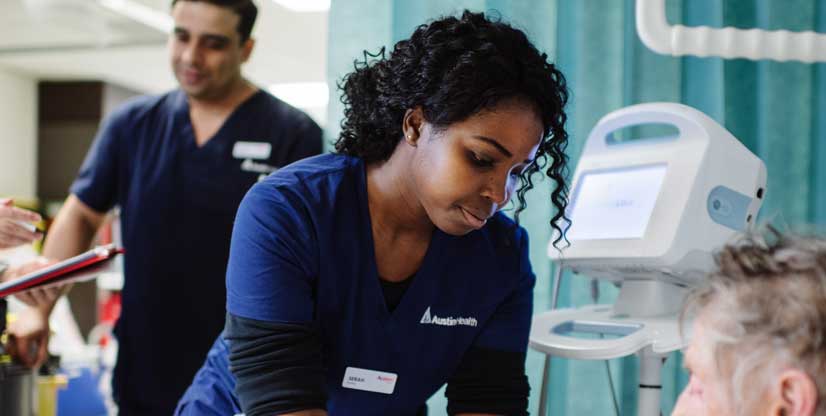Clinics & services
Victorian Respiratory Support Service
VRSS services
- Home
- Clinics & services
- Medical problems
- Victorian Respiratory Support Service
- VRSS services
VRSS Outreach Service
The VRSS Outreach Service is a small team made up of clinical nurse consultants, receptionist and biomedical engineers.
Our role is to:
- Work in partnership with the wider VRSS team to prepare you for discharge from hospital
- Provide you, your family and carers with discharge education
- Provide you with ongoing phone support
- Visit you at home to assist with any mask or ventilator issues
- Care for your tracheostomy tubes
- Provide support and equipment for those using Diaphragm Pacing
- Attend weekly outpatient clinic at Heidelberg Repatriation Hospital
- Attend regular satellite outpatient clinics at Bethlehem, BECC, Frankston, Bendigo and Geelong Hospitals
- Manage the purchase and supply of all ventilator equipment needed for care at home
- Periodically service/performance test all ventilators by phone, outpatient clinic appointment or home visit
- Repair broken equipment
Our Allied Health teams
Physiotherapy
Physiotherapists with expertise and experience in sleep medicine, ventilation and respiratory physiotherapy work within our team.
Their role includes:
- Starting people with chronic respiratory failure on a ventilator, normally a non-invasive ventilator (NIV) or mask ventilator
- Reviewing sleep studies with medical staff, to diagnose sleep-related breathing problems or to fine-tune ventilator settings.
- Assessing your breathing, ability to cough and clear phlegm effectively.
- Provide training in therapies that may improve breathing and cough
- Assessing and treating any acute health issues when you're admitted to the Austin Hospital
Social Work
You, your family and supports have access to two social workers, both while you're in hospital and after you've been discharged.
Our social workers provide you and their family with information and emotional support and can assist with any other concerns or questions that you may have.
They can also help with any discharge planning issues that may arise. This could include communicating and coordinating with health and community services on your behalf; completing referrals to community resources, for example, local council, aged care, NDIS and providing follow-up after discharge if required.
Speech Pathology
VRSS patients have access to Speech Pathology during their inpatient admission, day admission and community follow up as required. Speech Pathologists focus on helping you with communication and safe swallowing. They also work with the rest of the team to assess and support patients who have a tracheostomy.
Communication strategies and interventions are tailored to your needs. They include assessing cognitive-communication disorders, implementing augmentative and alternative communication (AAC) such as picture or letter boards, eye gaze, touch-to-speech applications on a device, communication partner training, ventilator-adjusted leak speech and use of a one-way speaking valve.
Swallow strategies focus on maximising safety, comfort and quality of life. Clinical bedside swallowing examinations, instrumental assessments including video fluoroscopy (moving x-ray of the swallow) and flexible endoscopic swallowing studies, support clinical decisions regarding appropriate textures of oral intake, swallowing rehabilitation and VRSS team discussions regarding enteral feeding.
Occupational Therapy
The VRSS occupational therapist provides assessment and treatment for those requiring invasive or non-invasive ventilation on the VRSS ward. Interventions completed by the Occupational Therapist include:
- Setting you up safely with equipment and assistive technology
- Discharge planning and community referrals to relevant funding bodies
- Maximising your participation and independence in activities of daily living
- Providing education resources to maximise your participation in meaningful activities
VRSS Neuromuscular Disease Clinic
The VRSS also conducts an outpatient clinic specifically for people with chronic respiratory failure due to neuromuscular diseases.
People with conditions such as motor neurone disease, Duchenne muscular dystrophy, spinal muscular atrophy, other forms of muscular dystrophy and post-polio syndrome often have significant respiratory muscle weakness, meaning that they have additional health care needs. The VRSS runs a specific clinic where people can see a Respiratory and Sleep doctor and a Neurology doctor. Outpatient review by allied health team members experienced in this complex and specialised area can also be organised.


